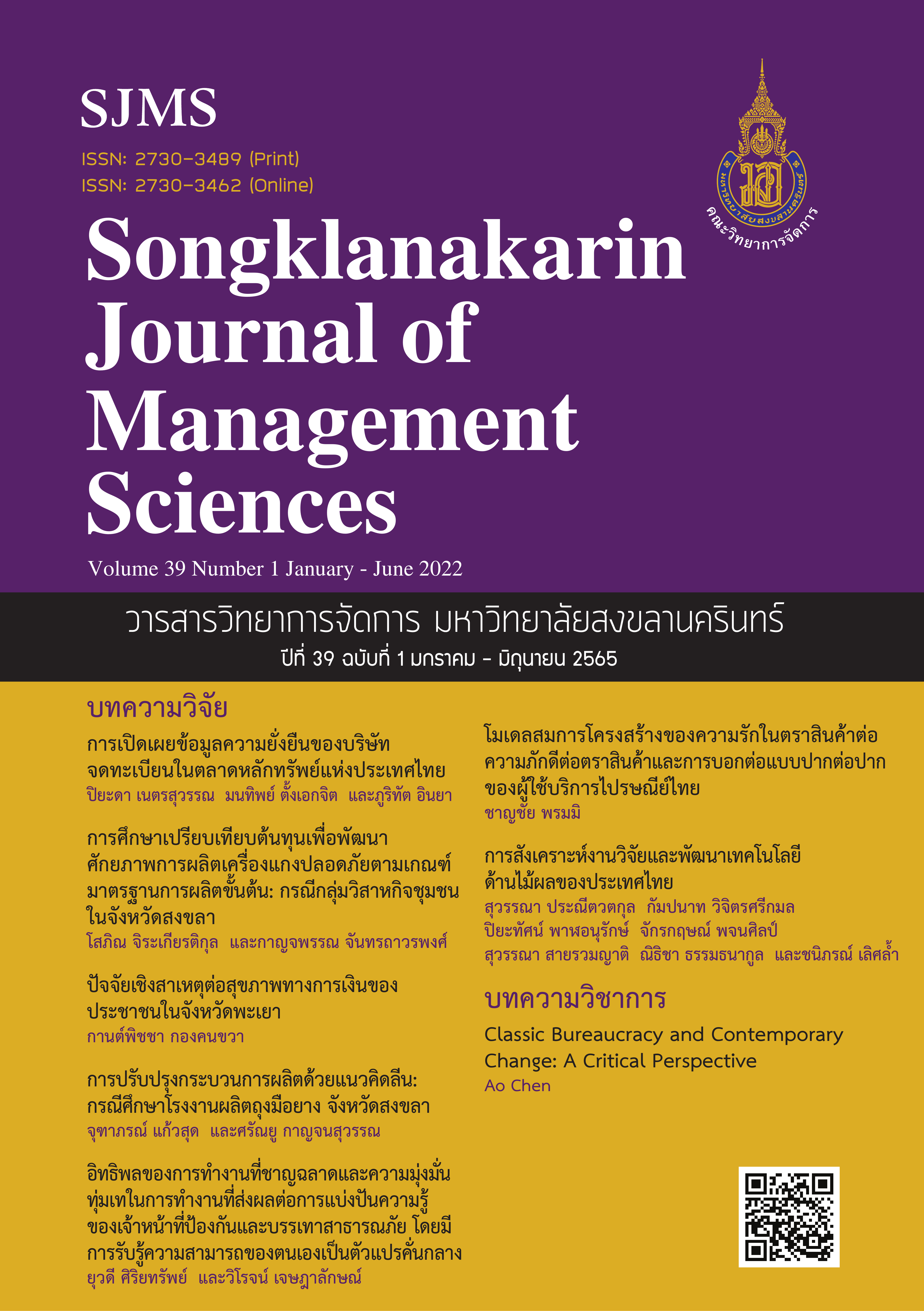Classic Bureaucracy and Contemporary Change: A Critical Perspective
Main Article Content
Abstract
Classical bureaucracy has been regarded as the dominant form of organization for ages due to its technical superiority and great efficiency. But, along with the rapid developments on technology, economy and society, the technical superiority and efficiency of classical bureaucracy has not kept up with advanced speed of contemporary business culture and even block survival and sustaining development of organizations. In order to deal with the dynamic environment, the aim of this paper is to discuss how today’s bureaucratic organizations change themselves to meet demands of post-modern business culture. The results reflect that the change do not mean the demise of bureaucracy and new forms of organization take over, on the contrary, they are merely seen as a further evolution of bureaucracy itself rather than a completely revolution.
Article Details

This work is licensed under a Creative Commons Attribution-NonCommercial-NoDerivatives 4.0 International License.
All published articles are SJMS’s copyright. The editorial board allows all published articles to be copied, excerpted, or disseminated with academic citation.
References
Alazzawi, M. (2008). Bureaucracy. Retrieved March 26, 2020, from http://www.scribd.com/doc/2440655/Bureaucracy
Alvesson, M., & Willmott, H. (2003). Studying Management Critically. London: Sage.
Alvesson, M., & Willmott, H. (1996). Making Sense of Management. London: Sage.
Avgerou, C. (2000). IT and organizational change: an institutionalist perspective. Information technology & people, 13(4), 234-262.
Baruch, Y. (2004). Managing Careers: Theory and Practice. Essex: Prentice Hall.
Beetham, D. (1996). Bureaucracy. Minneapolis: University of Minnesota Press.
Bovens, M., & Zouridis, S. (2002). From Street-level to System-level Bureaucracies: How Information and Communication Technology is Transforming Administrative Discretion and Constitutional Control. Public Administration Review, 62(2), 174-184.
Buchanan, D., & Huczynski, A. (2004). Organizational Behaviour: An Introductory Text. Essex: Prentice Hall.
Casey, C. (2004). Bureaucracy Re-enchanted? Spirit, Experts and Authority in Organizations. Organization Articles, 11(1), 59-70.
Clegg, S., Kornberger, M., & Pitsis, T. (2005). Managing and Organizations: An Introduction to Theory and Practice. London: SAGE Publications Ltd.
Clegg, S. (1990). Modern Organizations: Organization Studies in the Postmodern World. London: Sage.
Cordella, A. (2007). E-government: towards the e-bureaucratic form? Journal of Information Technology, 22(3), 265-274.
Cordella, A., & Tempini, N. (2015). E-government and organizational change: Reappraising the role of ICT and bureaucracy in public service delivery. Government Information Quarterly. 32(3), 279-286.
Crouch, C., & Streeck, M. (1997). Political Economy of Modern Capitalism: Mapping Convergence and Diversity. London: Sage.
du Gay, P. (1994). Making up Managers: Bureaucracy, Enterprise and the Liberal Art of Separation. The British Journal of Sociology, 45(4), 655-674.
Eagleton, T. (2012). Why Marx was Right. New Haven: Yale University Press.
Fischer, F., & Sirianni, C. (1994). Critical studies in Organization and Bureaucracy. Philadelphia: Temple University Press.
Friedman, M. (2002). Capitalism and Freedom. Chicago: London: UCP.
Giddens, A. (1971) Capitalism and Modern Social Theory. London: CUP.
Johnson, P., & Gill, J. (1993). Management Control and Organizational Behavior. London: Paul Chapman.
Kallinikos, J. (2004). The Social Foundations of the Bureaucratic Order. Organization Articles, 11(1), 13-36.
Kilcullen, J. (1996). Max Weber: On Bureaucracy. Retrieved April 5, 2020, from http://www. humanities.mq.edu.au/Ockham/ y64l09.html
Littleton, S. M., Arthur, M. B., & Rousseau, D. M. (2000). The future of boundary-less careers, in Collin, A. and Young, R.A (Eds), The Future of Career, Cambridge: Cambridge University Press.
Mommsen, W. J. (1989). The Political and Social Theory of Max Weber. London: Polity.
Morgan, G. (2006). Images of Organization. London: Sage.
Perry, M. (2002). Marxism and History. Palgrave: Basingstoke.
Pugh, D. S. (1973). Organization Theory Penguin: Harmondsworth.
Rhodes, C., & Milani Price, O. (2011). The post-bureaucratic parasite: Contrasting narratives of organizational change in local government. Management Learning, 42(3), 241-260.
Sahay, A. (1998). Max Weber and Modern Sociology. London: Taylor and Francis Ltd.
Su, Y. (2007). Modern Western Management Schools. Shanghai: Fudan University Press.
Watson, T. (2012). Sociology, Work, and Organization. London: Routledge.
Weber, M. (1947). The Theory of Social and Economic Organization translated and edited by A.M. Henderson and T. Parsons, New York: Oxford University Press.

